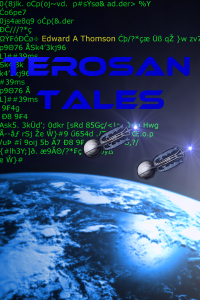Finally! I managed to get something published. Ok, so it is self-published rather than through a traditional publishing house but it is a milestone none-the-less. It is something that I could have / should have done years ago.
I’ve been writing for years and wandered aimlessly through the self-publishing (killing?) fields without actually pulling the trigger. In 2013 I created a new Twitter account for my creative writing and have engaged in some writing chatter. After year of wandering I decide that I should get something published. Anything. I enjoy writing and I think that the universes I’ve created are interesting and intriguing. Eventually, I came across Smashwords and decided that was the best way to go. And now I can present my first finished published work (excluding my PhD thesis of course, does that even count?):

Smashwords link: Terosan Tales
Four short stories set in the same universe which are the beginnings of a larger tapestry of interwoven stories.
For a brief summary of each story click on “Continue reading”: